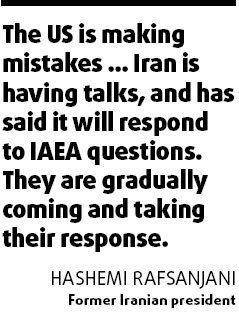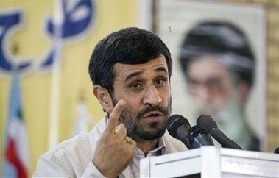World powers to push for Iran sanctions
Updated: 2007-11-03 10:20
Six world powers agreed on Friday to push ahead with a third sanctions resolution against Iran unless reports later this month show it has shown greater transparency about its nuclear program.
|
|
Political directors from Britain, France, Germany, the US, Russia and China will meet again on November 19 to assess reports from the UN atomic watchdog and from EU foreign policy chief Javier Solana, a spokesman for the British Foreign Office said.
"Political directors agreed to finalize a text for a third UN Security Council sanctions resolution with the intention of bringing it to a vote in the UN Security Council unless the November reports of Solana and ElBaradei show a positive outcome of the efforts," the spokesman said.
Iran has refused to stop enriching uranium and the West fears it is bent on producing atomic bombs.
The US undersecretary of state for political affairs Nicholas Burns met diplomats from the four other permanent security council members, along with Germany, aiming to rally support for tougher treatment of the Iranian government over its nuclear program.
The British Prime Minister Gordon Brown and France support the imposition of new sanctions if Iran continues to refuse to suspend uranium enrichment.
The US imposed economic sanctions last week and has not ruled out military action against Iran. Russia believes dialogue rather than more punishment is the way forward.

Speaking on Friday on her way to Turkey, US Secretary of State Condoleezza Rice said Washington had had some "tactical" differences with China and Russia about the timing and the "depth or breadth" of a Security Council resolution.
"But the Russians - when I talked to (Foreign Minister) Sergei Lavrov yesterday - he said they were prepared to come and work on the text as we agreed when we were together last and we will just have to see how those discussions go," she said.
The former Iranian president Hashemi Rafsanjani said talks between Iran and the UN nuclear watchdog were making progress, and criticized Washington's approach.
"The US is making mistakes," he said. "Iran is having talks, and has said it will respond to IAEA questions. They are gradually coming and taking their response. One has to wait, talk and make discussions."
The major powers agreed in late September to delay a vote on tougher sanctions until late November at the earliest after it had received reports by the UN nuclear watchdog and a EU negotiator.
After four days of talks with the International Atomic Energy Agency (IAEA) in Teheran meant to help clear up suspicions about Iran's atomic activities, both sides expressed satisfaction, Iran's state broadcaster reported on Thursday.
Mohamed ElBaradei, head of the IAEA, is due to report in mid-November about whether Iran has answered questions about its past secret nuclear activity.
Iranian President Mahmoud Ahmadinejad said this week Teheran would not retreat in the dispute and dismissed US offers of broader negotiations if Iran suspended its most sensitive atomic work.
Iran says its program is peaceful and aimed at generating electricity so that it can export more oil and gas.
Agencies
|
|
|
||
|
||
|
|
|
|
